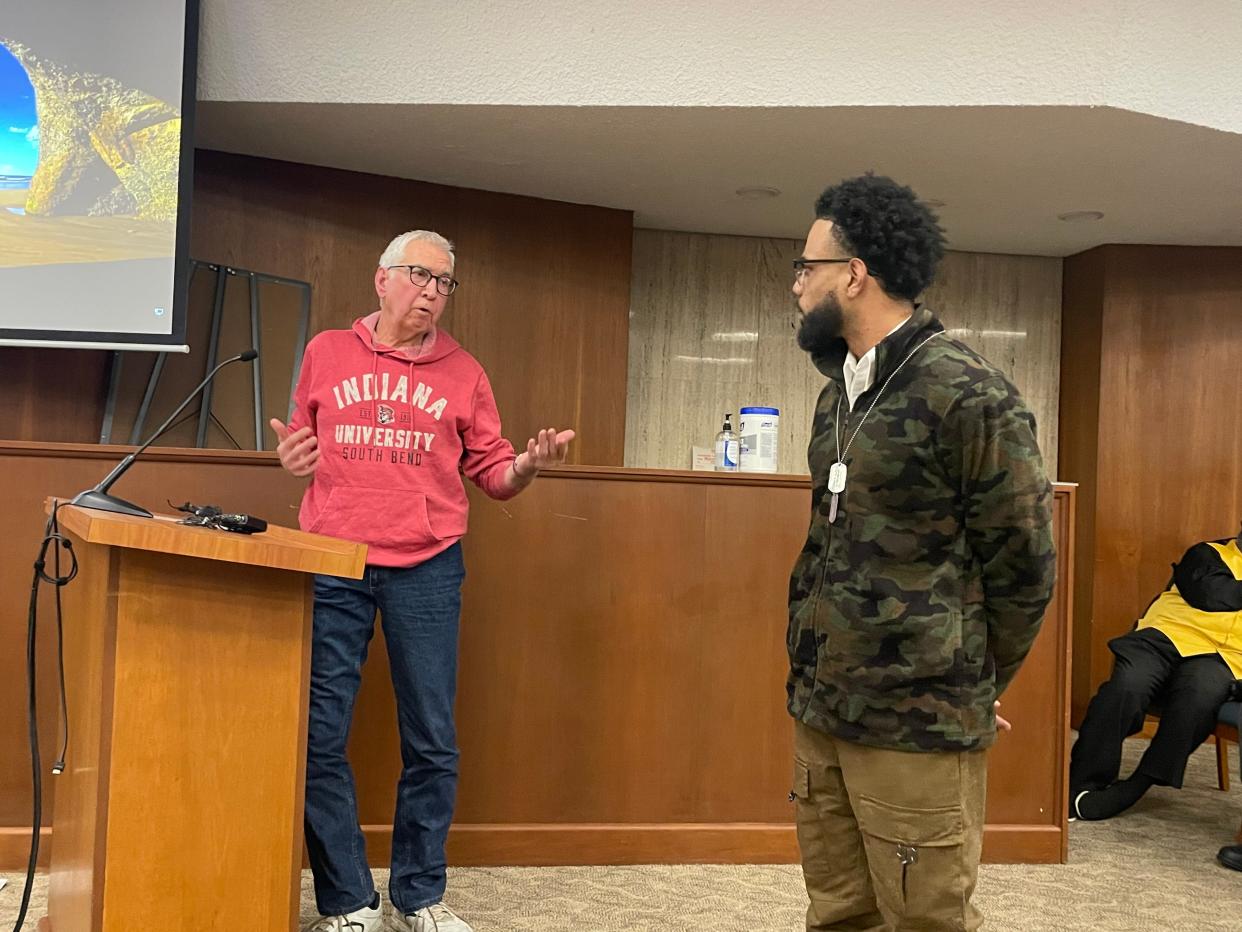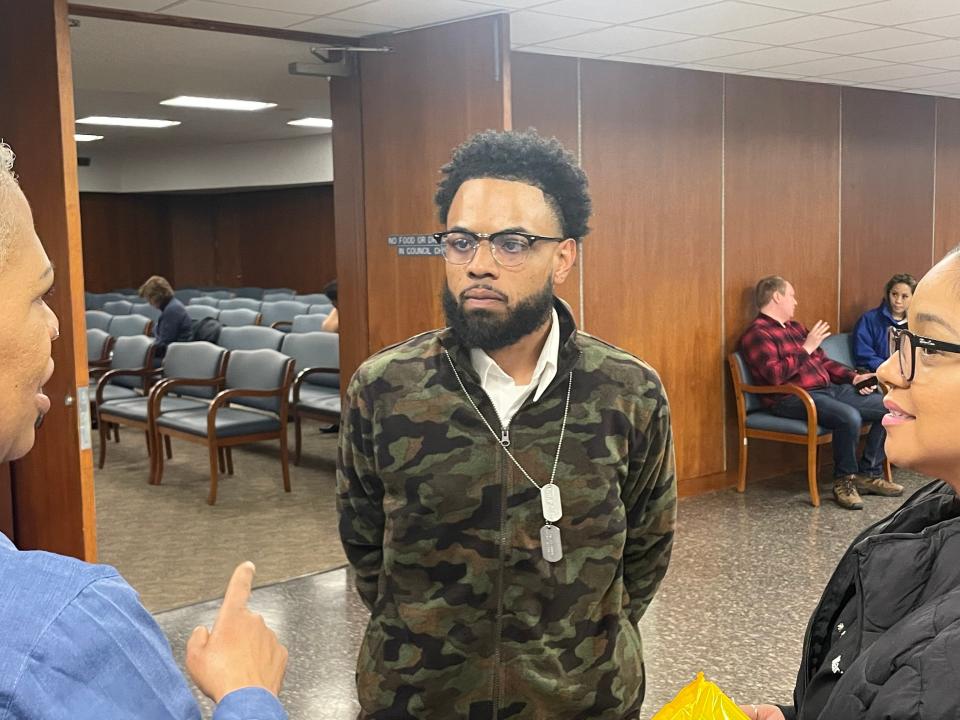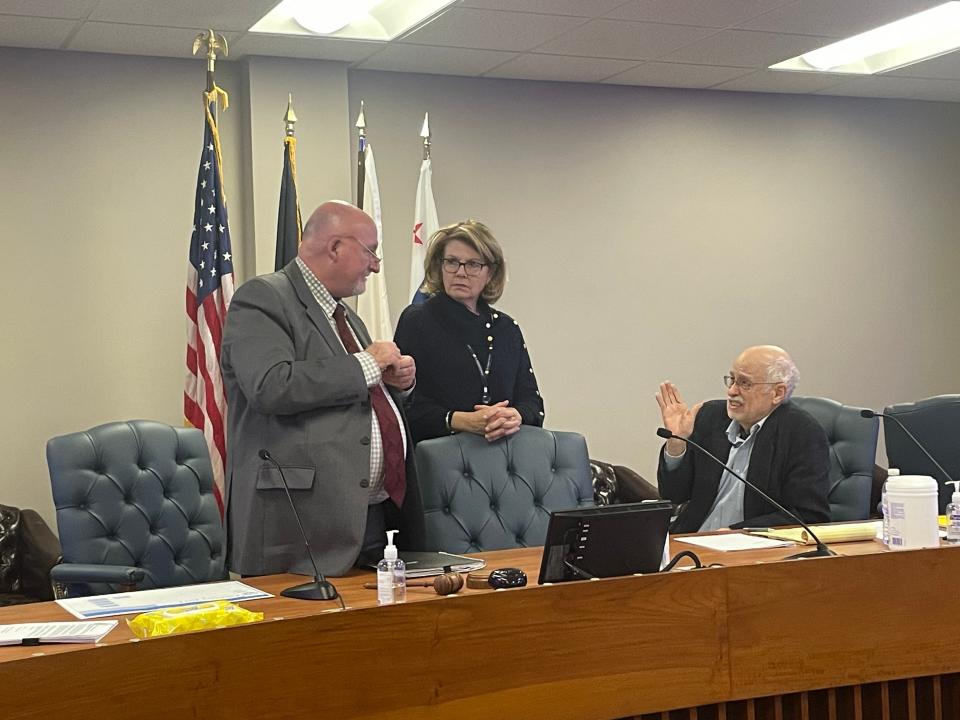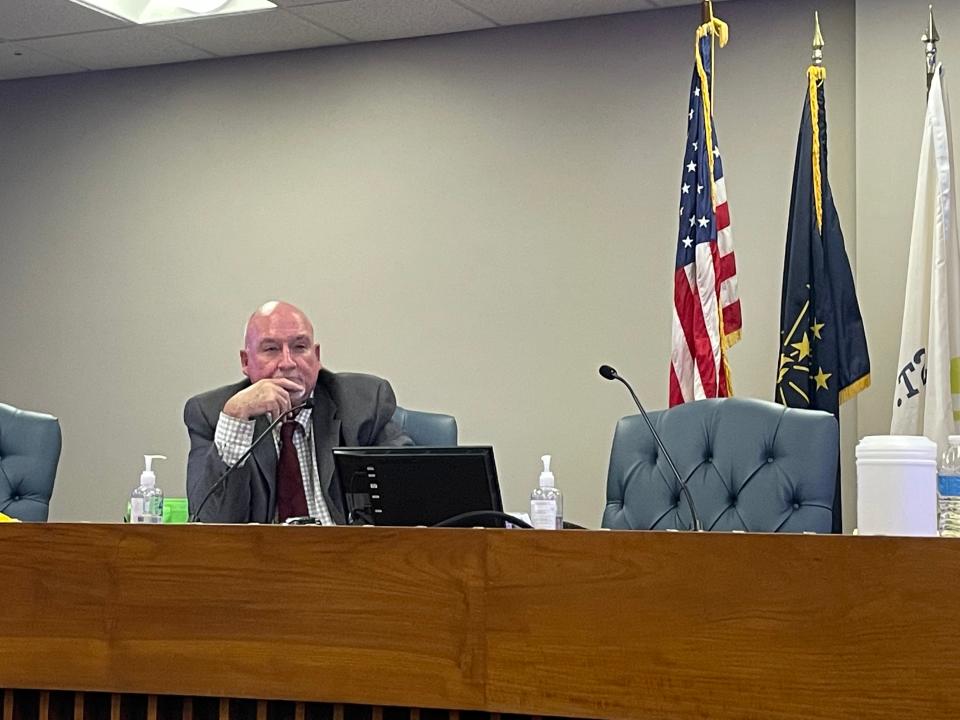After St. Joe County Election Board contradicts state law, any appeal would be made in court

SOUTH BEND — A state election official says only two people could appeal the St. Joseph County Election Board's ruling to allow candidate Bruce Mitchell Jr. on the May primary ballot: Mitchell himself or the man who challenged his eligibility.
Former St. Joseph County Treasurer Mike Kruk, who also served nine years on the county council, filed a formal challenge to 32-year-old Mitchell's candidacy for South Bend Common Council. Both men are Democrats, though Kruk is 71 and retired.
More:South Bend common council candidate allowed on Dems primary ballot despite new state law
The apparent contradiction of a new Indiana law and the county's decision Wednesday to allow Mitchell on the ballot left at least one Election Board member puzzled as to what may happen next.
Who can challenge the board's decision
According to Angela Nussmeyer, the Democratic co-director of the bipartisan Indiana Election Commission, state officials lack the power to overturn a county's decision about how to conduct elections.
Only Kruk and Mitchell have the standing to appeal the Election Board's decision in court, Nussmeyer said. The appeal would be heard in St. Joseph County as a regular civil case. A judge would presumably have to rule before the primary election.

Kruk told The Tribune on Thursday that he believes the three-member board's decision is a subversion of state law. It was "way out of bounds," he said.
“How can you have any faith in election fairness," Kruk asked, "when the board just haphazardly says we’re going to do what we want?”
But the cost of hiring an attorney deters Kruk from appealing. For now, the board's 1-1 decision means Mitchell is poised to be on the Democratic ballot this May, running against 6th District incumbent councilor Sheila Niezgodski.
St. Joseph County:Jail leadership settle lawsuit, will allow inmates access to educational literature
The Election Board's denial of the candidacy challenge

Republican member Tom Dixon said he denied Kruk's objection to avoid inadvertent racial discrimination against Mitchell, who is Black and Latino.
Republican County Clerk Amy Rolfes chose to abstain from voting at all, though she conceded that "a strict application of the relatively new state law would mean that the challenge made by the Democratic Party can be sustained."
Only Democratic member Chuck Leone said he saw nothing in Indiana law that would permit the board to allow Mitchell on the ballot.
Leone's in agreement with members of the Vanderburgh County Election Board, which last week voted 2-1 to remove two mayoral candidates who failed to fulfill the same law.
The Indiana Election Commission also used the controversial law last year to disqualify several candidates from statewide races.
The St. Joseph County Election Board may be the first body to act in spite of the law.
How the Election Board's choice seems to contradict state law
The so-called two-primaries law was passed in 2021, with Rep. Timothy Wesco, of Osceola, serving as the lead writer among four Republicans who drafted the bill.
The statute mandates that candidates who enter primaries as either a Democrat or a Republican must have cast a ballot for the party they wish to represent during the last two Indiana primary elections in which they voted. Failing to qualify with their voting record, candidates can still run if they earn the approval of their county political party's chairperson.
Everyone agreed that neither condition was met in Mitchell's case. He last voted in the 2016 primary as a Democrat, according to Democratic Party chair Diana Hess. Hess chose not to use her authority to approve his candidacy.
Leone worries county election officials encounter a "slippery slope" when undermining laws passed by the Indiana General Assembly.
"If we, as an election board, decide that we're not going to follow the letter of the law as it's written in this instance," Leone said, "then what is the rule, what is the threshold, under which we are also going to ignore Indiana law under other circumstances?"

Dixon said he's willing to make an exception to state law because there was “evidence that somebody in a protected class is not being treated fairly.”
Hess said she decided on a broad, equal application of the two-primaries law that Mitchell and one other candidate failed to meet. Dixon offered no evidence of discrimination beyond the fact that those two prospective candidates happen to be Black.
Moreover, Leone said, Dixon and Rolfes were wrong to consider federal discrimination law in a dispute that concerns the authority of a county election board.
Having served for about seven months, Leone, a longtime employment attorney, is the board's most experienced member. Dixon, also an employment lawyer, was appointed by the St. Joseph County GOP last fall after former Republican member Ben Horvath resigned at the end of September. Rolfes joined the board this January after winning the county clerk's position in November.
The purpose of the new law
Members of both parties said they support the law's attempt to prioritize voting history. Previously, state law required candidates to have voted according to party affiliation in only one primary instead of two.
Because Indiana voters don't register as Democrats or Republicans, voting history is a crucial, objective measure of a candidate's political convictions, Hess said.
“The intent of the statute is to prevent people from hopping from one primary to another to sabotage a candidate on the other side," Dixon, the Republican board member, said, "and that seems to be a legitimate goal in a state where we have segregated primaries."
2023 municipal elections:Lots of challengers file to run in primary, shaking up races for South Bend city offices
Throughout the discord, Kruk, Hess, Leone and Dixon all reiterated their respect for Mitchell as an Iraq War veteran and a promising young candidate. Democratic leadership acknowledged how the law may inordinately prevent younger, inexperienced candidates from running.
To avoid that outcome, Hess said, she may reconsider whether to approve some candidates in future years.
Mitchell's character aside, Kruk said he worries about the implications of an election board ignoring state law in the wake of Republican election denial spreading nationwide after 2020.
“By doing that over time, you eventually get people to the point where they’re discouraged from even voting because they feel like the process is corrupt,” Kruk said.
“From that standpoint, I think it would be worth pursuing,” he said of a court appeal, “but for me to take that all on myself could get expensive.”
How the statutory dispute became personal
What’s more, Kruk has faced backlash for his role in the debate.
A few days after a Feb. 15 Election Board hearing, Kruk was outside on a Saturday doing yard work. His blue, rusted Ford Ranger was parked with the passenger’s side facing the curb, so he couldn’t see the driver’s side of the truck while looking from his home.
He came around the truck that weekend morning to find his two left tires slashed, he said. A single word was scrawled in pink spray paint on the front door: “Cruel.”

“This can’t be a coincidence,” he recalled thinking. “I’ve lived on this street here for 30-some years and have never had any of my vehicles vandalized or any kind of vandalism.”
When asked about the alleged vandalism by a reporter Wednesday, Mitchell said he hadn't been aware it occurred.
“People are angry,” Mitchell said. “That’s one thing I can’t control.”
All Mitchell wanted out of this dispute is an opportunity to run, he said.
"If it’s no at the end and I don’t win, that’s OK," he said. "I’ll shake (Niezgodski's) hand and endorse her."
Email South Bend Tribune city reporter Jordan Smith at JTsmith@gannett.com. Follow him on Twitter: @jordantsmith09
This article originally appeared on South Bend Tribune: St. Joseph County Election Board contradicts Indiana's two-primaries law

